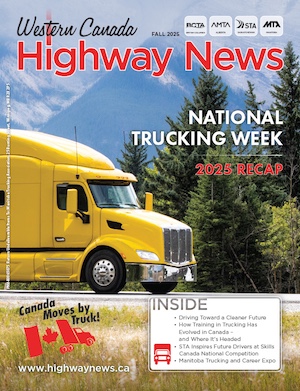If you have lived with poor mental health or endured mental illness, you are not alone.
The Mental Health Commission of Canada states that one in five Canadians experience a mental health problem or illness every year. That’s about seven million of us.
In fact, the Canada Safety Council says mental health claims are the fastest growing category of disability costs in Canada. Mental health has a colossal impact on the way that we function at work, home, and in our personal lives. Yet, the stigma and silence still lingering around the commonly felt struggle is only beginning to lift.
The Canadian Mental Health Association (CMHA) says that 50% of the population will have or have had a mental illness by the age of 40. According to the Canadian Trucking Alliance (CTA), the average age of a Canadian trucker is 47 years (and rising), with a third of drivers over 55. Numbers suggest a serious reality for drivers and staff employed in the industry.
It is our responsibility to look after ourselves. It is our responsibility to care about our coworkers and our employees. But, with something so daunting, how can you know where to start?
Mental Health Versus Mental Illness
Trucking HR Canada says the first step to addressing mental health in the workplace is understanding what it is in the first place.
Mental health is often used interchangeably with mental illness but the terms are completely different. It is as different as physical health and physical illness. Physical health is a scale (your health can be good or it can be bad), whereas physical illness can mean many things (from arthritis to the flu or diabetes). Mental health is a scale as well, whereas mental illness is a blanket term that covers many things (from anxiety to depression or schizophrenia).
According to the CMHA, one in five people in Canada will experience a mental health problem or illness in any given year, but five in five of us have mental health.
“Mental health isn’t simply the absence of mental illness and living with a mental illness doesn’t mean you can’t have good mental health.” The CMHA adds, “Even if you don’t have a mental illness, that doesn’t mean you’ll feel great all the time. Just like anyone can catch a cold or flu, everyone can experience the ebbs and flow of well-being. So, there’s not just the one in five of us who have mental illnesses, and ‘the rest of us’ who don’t. There is no rest of us. There is just us – all five in five. We are all on the same team.”
According to the CMHA, good mental health looks different from person to person. Yet, there are six universally agreed on outcomes of achieving a healthy mental life. They include having a sense of purpose, keeping strong relationships, feeling connected to others, having a good sense of self, coping with stress, and enjoying life.
Poor mental health can be determined by multiple factors – social, psychological, and biological factors. According to the World Health Organization, “Poor mental health is also associated with rapid social change, stressful work conditions, gender discrimination, social exclusion, unhealthy lifestyle, physical ill-health, and human rights violations.”
In 2018, Statistics Canada stated that roughly 5.3 million people in Canada mentioned they needed some help for their mental health in the previous year. Almost half of these Canadians either had their needs partially met with some help (1.2 million people) or had needs that were fully unmet (1.1 million people). The most frequently reported reasons for having unmet or partially met needs were related to not knowing where to go, being too busy, or not being able to afford to pay.
What About Truckers?
Every workplace is different, but the trucking industry can bring unique challenges in many areas – particularly for those employed in long-haul trucking, which can present challenges in taking care of oneself both physically and mentally.
Truck drivers are often away from friends and family, work in isolation, and encounter higher stress. They also may not be able to regulate their physical health with exercise, food awareness, and sleep.
Trucking HR Canada just released a mental health guide titled Gearing Up for Workplace Mental Health: Best Practices and Resources for Employers. It quoted a 2012 study: “Research suggests that drivers are at risk of several occupational-health-induced conditions. These include, but are not limited to, loneliness (27.9%), depression (26.9 %), chronic sleep disturbances (20.6%), and anxiety (14.5%).” Truckers have also been reported suffer from post-traumatic stress disorder (PTSD) or acute stress disorder from accidents that they may have been involved in on the road.
These conditions impact not only the employee’s life, they impact their employer as well. The Mental Health Commission of Canada reports that 82% of responding organizations ranked mental health conditions in their top three causes of short-term disability (72% for long-term disability), causing the average responding organization to spend more than $10.5 million annually on absence claims. That’s a lot of money, much more than employers would spend by proactively confronting the problem.
“Return on Investment (ROI) is an important factor for all companies in deciding where to invest their time, money and talent,” says Trucking HR Canada.
“The accounting firm PriceWaterhouseCoopers (PwC) found an average $2.30 per return on every dollar invested in creating a mentally healthy workplace.” The return is in the form of less absenteeism, productivity, as well as lessened short-term and long-term disability claims.
“It’s good for people and good for business to invest in workplace mental health.”
Gearing Up for Workplace Mental Health: Best Practices and Resources for Employers says that employers can work toward a healthier workforce in the following ways:
• By offering an employee and family assistance/employee assistance program.
• By demonstrating a work-life balance.
• By offering flexible work arrangements.
• By providing Mental Health First Aid training.
• By developing workplace mental health policies.
• By integrating mental health into the organizational culture and workplace.
• By signing the Mindful Employer Charter.
• By adopting the National Standard of Canada for Psychological Health and Safety in the Workplace.
• By participating in the Working Mind Program.
• By participating in Not Myself Today®.
• By participating in the Elephant In The Room campaign to fight stigma.
The guide was created to help fleet employers maintain healthier workplaces by showing best practices and resources to help fleet employers of all sizes ‘on the road, in the office, and in the yard.’ The resource implements a two-step approach for employers: understanding and then action planning. It contains successful case studies and pages of resources.
“Recruitment and retention best practices include an increased focus on employee wellness, which includes mental health,” says Angela Splinter, CEO of Trucking HR Canada. “Gearing up for Workplace Mental Health can help employers of all sizes whether they are just starting out, or they are looking to improve their current practices.”
Mental Health in the Time of COVID-19
As the world changes, so do stressors that take a toll on mental health. As people are forced to isolate from the world, truckers are on the front line as essential workers. This is not an easy situation on anyone, but for those still working, mental health is a major concern.
“With coronavirus (COVID-19) now officially being called a pandemic by the World Health Organization, public fear and anxiety are on the rise,” the CMHA writes, “Your employees may be experiencing a high degree of uncertainty, worry and stress about the health and safety of their loved ones, and how this pandemic may disrupt their work and personal lives.”
They urge employers to support the psychological health and safety of employees by having a plan to address concerns, and by communicating openly with employees on a regular basis, empathizing with employees while referring them to company resources, reassuring employees as much as possible, understanding when an employee needs assistance, and recognising that it is not business as usual.
“While employers are preparing responses to safeguard their business operations and protect the physical health of their employees during this crisis, it’s important to consider everyone’s psychological health and safety, too.”
Companies should look to helping their employees with any supports that they can. One company doing this is Trimac Transportation, highlighted in a feature on www.benefitscanada.com. Trimac has partnered with Calgary-headquartered wellness app ‘Headversity’ to provide help and training to its workers across North America.
“There has never been a more important time to take care of the mental health of all of our team members,” says Kara Gillespie, Vice-President of People and Culture at Trimac, in a press release. “The Headversity app is the perfect tool for us to reach all of our people who are spread out geographically across North America. They can use it any time, anywhere, in private, in small or large doses and with full access to vital information and support to help them face each day feeling more empowered over their own mental health and take things one day at a time.”
The Canadian Trucking Alliance also recommends ‘Starling’, which they wrote was targeted toward truck drivers specifically to ‘combat their stress, anxiety related to the COVID-19 pandemic.’ The program is free and offers workers ‘with a smartphone or computer strategies and tools to help them with their day-to-day routines.’
Achieving and maintaining good mental health isn’t a one-person journey, explains the CMHA, “Each setting and situation you’re in, and each person you interact with, can impact your well-being. This means that to truly achieve good mental health for all, it must be a common theme in every workplace, school, and neighbourhood.”
There is no better time than now – during the COVID-19 pandemic – to look toward how to improve your workplace or create a place where employees find support for their mental well-being.
No solution is going to be perfect, but as a collective we can work as an industry to make things better, for everyone.


 1-866-985-9791
1-866-985-9791



